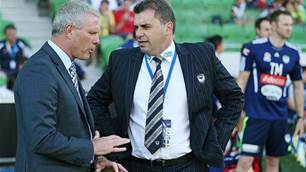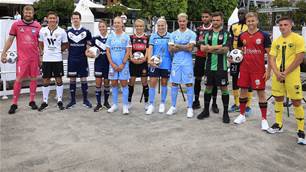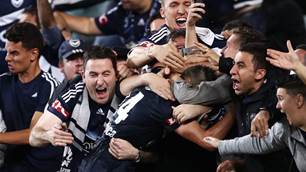WITH the future of their Hyundai A-League club in the balance, a group of Gold Coast United supporters have resolved to form a steering committee that will investigate the possibility of community-based ownership.
Nearly 200 people, including fans, sponsors, players and coach Mike Mulvey attended a snap meeting at Griffith University on Wednesday night to approve the establishment of a supporters trust to save the team.
Buoyed by the success of fan ownership models in the United States and Europe, the committee will now be tasked with turning the hopes and dreams of Gold Coast diehards into a reality.
Professor James Skinner of Griffith University, who facilitated the open forum, said time is of the essence with a target of $5 million in sight.
"The committee is driven by a sense of urgency and the need to come up with a viable business model that appeals to the FFA," he said.
Football Federation Australia will operate Gold Coast for the rest of the season after successfully stripping outspoken billionaire Clive Palmer of his licence to run the club last week.
But what will happen beyond this campaign is unclear, with FFA's precarious financial position and its earlier abandonment of North Queensland Fury suggesting it may be unwilling to bankroll the club further.
The future of United takes on particular importance when viewed in the light of the forthcoming television rights deal. Negotiations for that are expected to ramp up over the coming months.
The FFA will be in a better bargaining position if they can boast a 10-team competition, but the likelihood of a western Sydney franchise being rushed into the league could spell Gold Coast's demise.
Club captain Michael Thwaite speculated at the forum that the expected increase in cash from the new broadcast deal could give FFA enough resources to at least partly fund the club.
FFA are already engaged in discussions with the local federation, Gold Coast Soccer, and the state governing body, Football Queensland, over keeping United in the competition.
It is understood Gold Coast Soccer has proposed the use of Metricon Stadium as a home ground for the Hyundai A-League team.
Palmer was previously critical of the 'exorbitant' and 'prohibitive' stadium deal at Skilled Park, which was so expensive that it prompted him to reconfigure seating arrangements to save money, infuriating fans.
The viability of any Gold Coast team will hinge on the economics of their home ground, and it is thought the refurbished Carrara stadium, managed by the Gold Coast Suns, is a better financial option.
Professor Skinner said that Palmer, who is still at war with FFA through his rebel body Football Australia, remains a 'very, very important player' in the future of football on the tourist strip.
"I think Clive Palmer is vital to this and I think he wants to be involved with football on the Gold Coast and he sees the benefits for the community in general," he said.
"There's a lot of rhetoric but if you scratch beneath the surface, both parties want the best outcome. If they can find common ground they're happy to do so, it's just a matter of negotiation."
Fan spokesman Nathan Mulhearn said the fans would be open to Palmer returning to the club, with caveats.
"The model that we're trying to set up is that anybody donating money or investing wouldn't have the say or the power that's been in the past," he said.
"They would warm to the idea of Clive Palmer being involved if that was the case. There's a lot of water to go under that bridge."
Related Articles

Kiwi legend: A-League can seize the day post-COVID-19

Backlash over Fox Sports new season launch













